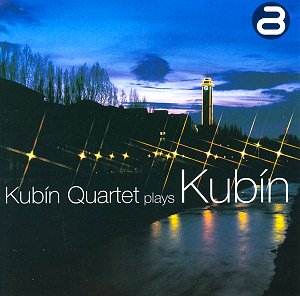I
have been enjoying listening to four Arco Diva releases recently.
This is not the first time we have carried reviews of discs from
that label. Two years ago when Dr Jenner was writing for us he
tackled several CDs of the music of Sylvie Bodorová. More
recently I returned to their website because I had heard that
they had recorded Ronald Stevenson's String Quartet. The Kubín
was part of the parcel of other discs accompanying the Stevenson.
Kubín
was born in the anthracite-production town of Ostrava. After the
creation of Czechoslovakia in 1918 it became, through its steel
industry, even more important as an economic and cultural centre.
Musical life was vigorous with chamber music concerts each devoted
to a single composer including Novák, Fibich, and Dvořák.
There was an eight concert season devoted entirely to Foerster.
Kubín studied with Haba and in his teens wrote several quarter
tone compositions. He joined the Czech Radio Symphony Orchestra
as a cellist. In 1935 he returned to Ostrava and there joined
Erwin Schulhoff at the radio station. He became a major player
in the musical life of Ostrava.
Jiři
Štilec's Arco Diva label is predominantly chamber focused and
so it proves with this disc. It is helpful to compare the spread
of styles across the recent Arco Diva discs. Kubín's music
is the toughest in this range. Mácha is quite traditional
by comparison while Bodorová, much younger, also He was
a pupil of Alois Haba though he is not quite the absolutist you
might have feared or hoped for. His First Quartet is closer
to Bartók than to Schoenberg but the 12-tone element is
certainly evident. His music, ripe with interest, adopts folklike
material and mannerisms so it is never completely alien.
Thirty-four
years later comes the Humoresques. As the useful
notes observe this five movement character suite (On the Train,
Evening Bells, Kinematofone, Modern Love,
The Clown) is substantially a set of concerto-panels for
clarinet with an orchestra of violin, viola and cello. The years
here softened Kubín's idiom into a yielding and pliable
song with busy surreptitious writing for the clarinet as well
as typically rounded woody lyricism. Voices in the Kubín
blend include Ravel, Hindemith and de Falla with a merest shade
of Weill's scathing satire. The pieces would go well alongside
Arthur Bliss's Five Conversations and Finzi's Bagatelles.
The
date of the Concertino is not given but it sounds
as if it lies between the quartet and the Humoresques.
There is here more Weill in the mix. It is in six movements with
the double bass taken a prominent role often pouring dour water
on the exuberance and cheek of the octet.
Rob
Barnett
The
Arcodiva catalogue is now offered by MusicWeb

![]() for
details
for
details